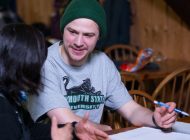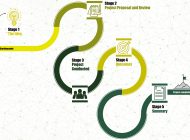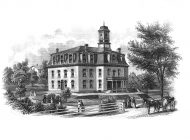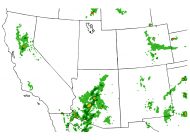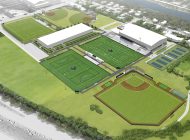Kaleb Hart ’11 photo.
In the last year I’ve heard many things about clusters. Across campus there have been public discussions and private conversations. I’ve heard that clusters involve just research, or they are limited to industry, or they are simply just another fad in higher education these days.
There are research clusters at top research institutions where various disciplines come together and conduct research to find solutions to problems or to invent new things. However, I wasn’t sure what clusters would mean to Plymouth State since our tradition has focused primarily on teaching and service to the community. Not only have clusters come to organize academic affairs at PSU but also our institution is being reorganized in an integrative fashion across departments. At this point, I know that we’re evolving as an organization and we’re embarking on something very different from practices at other institutions. This is no fad.
A guiding force
Institutions that have research clusters are still organized within and by a traditional academic framework that has been colloquially described as academic silos that tend to isolate rather than integrate. This is where we are different. Integrated clusters are now the guiding force for Plymouth State University. We define a cluster as an organizational unit comprised of faculty, staff, and students who come together to engage in collaborative, interdisciplinary work that transcends individual disciplines and thus, breaks down those silos. Integrated clusters are academic homes for faculty, students, staff, programs, curricula, research, and projects. Through these clusters, we will engage with partners from the community and beyond. Our partners will benefit from our integrative infrastructure. We are modeling integrative thinking between disciplines and across clusters both on and off campus.
By organizing academic affairs in this way, we envision possibilities for collaboration across disciplines and across clusters. What we imagine might involve research, evolving our curricula to meet the needs of the future, developing specific projects, finding innovative ways to partner with external publics, and getting students out of the classroom to be involved with ideas in action, multiple disciplines, and solving real-world problems. Through this integrative experience, students see how working with others leads to broader understanding of how to solve problems collaboratively.
By situating integrated clusters as the primary organizing structure in academic affairs, we break down silos, enabling students and faculty to see the interface between disciplines. Additionally, by having an integrative organizational infrastructure, we can work more effectively and efficiently across all facets of the institution.
Some new features of this vision involve developing open lab spaces, a physical or virtual space that supports integrated clusters engagement. We believe these kinds of experiences better prepare our students to be engaged citizens when they graduate. PSU students will be integrative thinkers who are able to collaborate and be responsible active agents in their chosen fields.
Leading the way
Plymouth is distinguishing itself from other institutions. We are the first institution to take this path of re-imagining all of the work of our institution, and I believe we will be successful in at least two fundamental ways. First, integrated clusters will make us stand out among higher education institutions, which will cultivate our economic sustainability. Second, and more importantly, we are changing the higher education landscape one integrated cluster idea at a time. In a few years, other institutions will come to us and say, “How can you help us do what you are doing?” But the proof is in the pudding. Our students will be the best evidence of our successes. They will be leaders, entrepreneurs, innovators, protectors, inventors, and inclusive moral agents making a difference in the world. –Annette Holba
Annette Holba is professor of rhetoric at Plymouth State University.

Hear more from Annette Holba and her take on PSU’s integrated clusters model on the latest edition of Colloquy, PSU’s podcast series here.
Tags: academic model Annette Holba clusters integrated clusters interdisciplinary open labs transform transformation






